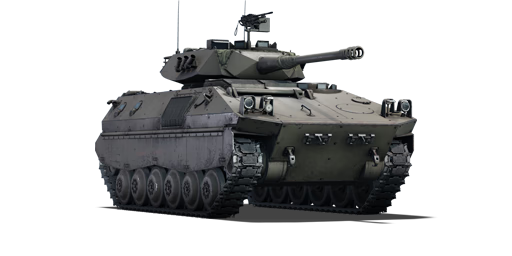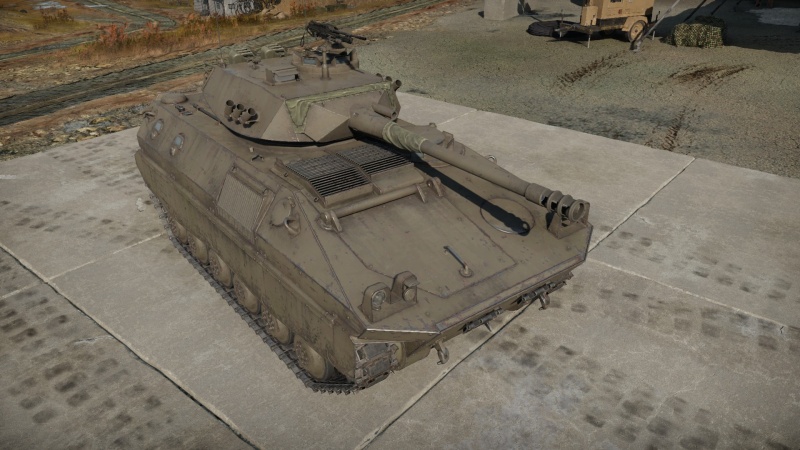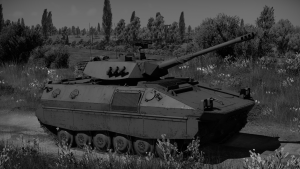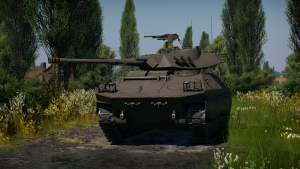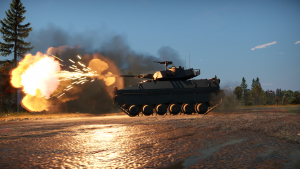Difference between revisions of "C13 T90"
Colok76286 (talk | contribs) (→Ammo racks: Updated section) |
(→History: added media) (Tag: Visual edit) |
||
| Line 189: | Line 189: | ||
== History == | == History == | ||
| − | <!-- ''Describe the history of the creation and combat usage of the vehicle in more detail than in the introduction. If the historical reference turns out to be too long, take it to a separate article, taking a link to the article about the vehicle and adding a block "/History" (example: <nowiki>https://wiki.warthunder.com/(Vehicle-name)/History</nowiki>) and add a link to it here using the <code>main</code> template. Be sure to reference text and sources by using <code><nowiki><ref></ref></nowiki></code>, as well as adding them at the end of the article with <code><nowiki><references /></nowiki></code>. This section may also include the vehicle's dev blog entry (if applicable) and the in-game encyclopedia description (under <code><nowiki>=== In-game description ===</nowiki></code>, also if applicable).'' --> | + | <!-- ''Describe the history of the creation and combat usage of the vehicle in more detail than in the introduction. If the historical reference turns out to be too long, take it to a separate article, taking a link to the article about the vehicle and adding a block "/History" (example: <nowiki>https://wiki.warthunder.com/(Vehicle-name)/History</nowiki>) and add a link to it here using the <code>main</code> template. Be sure to reference text and sources by using <code><nowiki><ref></ref></nowiki></code>, as well as adding them at the end of the article with <code><nowiki><references /></nowiki></code>. This section may also include the vehicle's dev blog entry (if applicable) and the in-game encyclopedia description (under <code><nowiki>=== In-game description ===</nowiki></code>, also if applicable).'' -->[[File:C13 T90 During tests.png|thumb|C13 T90 During tests]] |
| − | |||
The OTO Melara C13 family of vehicles would begin development during the early 1980s. First officially announced in 1981 in many Italian military magazines, the C13 was specifically developed in the hopes for the Italian army to replace the several American M113 APCs they had in service. It was presented publicly in its basic version in 1982 as the first prototype armed with a 12.7 mm machine gun. This APC version would be able to carry 11 infantrymen and the driver, and would be powered by a Isotta-Fraschini supercharged diesel engine which produced 330 hp, it would also have a considerable top speed (60 km/h) for a vehicle of the era. It would also have a range of 500 km, which made it a very desirable vehicle for many nations that operated the M113 APC. Technically speaking, it could also be amphibious but to make it work, no form of turret was able to be installed so only the APC variant could cross bodies of water, it would be propelled similarly to the M113. It wouldn't be very armoured, but when compared to the M113 APC it did offer an improvement. | The OTO Melara C13 family of vehicles would begin development during the early 1980s. First officially announced in 1981 in many Italian military magazines, the C13 was specifically developed in the hopes for the Italian army to replace the several American M113 APCs they had in service. It was presented publicly in its basic version in 1982 as the first prototype armed with a 12.7 mm machine gun. This APC version would be able to carry 11 infantrymen and the driver, and would be powered by a Isotta-Fraschini supercharged diesel engine which produced 330 hp, it would also have a considerable top speed (60 km/h) for a vehicle of the era. It would also have a range of 500 km, which made it a very desirable vehicle for many nations that operated the M113 APC. Technically speaking, it could also be amphibious but to make it work, no form of turret was able to be installed so only the APC variant could cross bodies of water, it would be propelled similarly to the M113. It wouldn't be very armoured, but when compared to the M113 APC it did offer an improvement. | ||
| − | + | [[File:C13 T90 (1) Trials.png|thumb|C13 T90 During Trials]] | |
More testing of the first prototype lead to around 5 more prototypes to be made, some with some quite unique armaments. The OTO C13 would be able to be configured in many variants, which included the TC-20, either armed with a 20 mm RH202 auto-cannon or 25 mm Oerlikon auto-cannon. Another version would be the TUA (TOW under armour) version which would use the M901 ATGM system. In the anti-air sector, there were plans to create the C13 25x4, which utilized the SIDAM-25 turret, although all the parts were constructed, due to political reasons the anti-air version never actually would be fully put together. Lastly, but certainly not least, there was the CKL T90 version, which would be armed with a Cockerill Mk3 90 mm cannon. This version specifically would utilize the same turret and armament that was previously installed on the Fiat 6616 / AUBL/74. Unfortunately, none of these models would actually be picked up by the Italian army. | More testing of the first prototype lead to around 5 more prototypes to be made, some with some quite unique armaments. The OTO C13 would be able to be configured in many variants, which included the TC-20, either armed with a 20 mm RH202 auto-cannon or 25 mm Oerlikon auto-cannon. Another version would be the TUA (TOW under armour) version which would use the M901 ATGM system. In the anti-air sector, there were plans to create the C13 25x4, which utilized the SIDAM-25 turret, although all the parts were constructed, due to political reasons the anti-air version never actually would be fully put together. Lastly, but certainly not least, there was the CKL T90 version, which would be armed with a Cockerill Mk3 90 mm cannon. This version specifically would utilize the same turret and armament that was previously installed on the Fiat 6616 / AUBL/74. Unfortunately, none of these models would actually be picked up by the Italian army. | ||
| − | + | [[File:C13 T90 Testing Fire.png|thumb|C13 T90 During fire Test]] | |
In the export market, it did generate some interest, a model of the C13 had been evaluated in Iraq at one point. However, the economic and political situations of the 1991 Gulf War would seriously impact the commercial success of this family of tracked vehicles, similarly to the OF-40. Another nation that showed some interest was Germany, more specifically Mak System Gesellschaft which wanted to cooperate with Italy to create a more advanced family of vehicles based on the OTO C13, this would lead to the OTO AV-90 (armoured vehicle 90) which would be based on the C13 but incorporated a series of improvements. The AV-90 program would likely have its funding cut by Germany so the program was shut down, thus putting an end to any sort of potential buyers of the vehicle. | In the export market, it did generate some interest, a model of the C13 had been evaluated in Iraq at one point. However, the economic and political situations of the 1991 Gulf War would seriously impact the commercial success of this family of tracked vehicles, similarly to the OF-40. Another nation that showed some interest was Germany, more specifically Mak System Gesellschaft which wanted to cooperate with Italy to create a more advanced family of vehicles based on the OTO C13, this would lead to the OTO AV-90 (armoured vehicle 90) which would be based on the C13 but incorporated a series of improvements. The AV-90 program would likely have its funding cut by Germany so the program was shut down, thus putting an end to any sort of potential buyers of the vehicle. | ||
Revision as of 20:33, 27 October 2021
Contents
Description
The OTO C13 T90 is a rank V Italian light tank with a battle rating of 7.0 (AB/RB/SB). It was introduced in Update "Direct Hit".
General info
Survivability and armour
The C13's armour is only effective against enemy machine gun fire, and in lucky cases can bounce a few shots if hit at a specific angle. Generally speaking you can get taken out easily from all sides.
Armour type:
- Aluminium alloy 5083 (hull)
- Rolled homogeneous armour (hull, turret)
| Armour | Front (Slope angle) | Sides | Rear | Roof |
|---|---|---|---|---|
| Hull | 38 + 6 mm (73°) Upper 50 + 13 mm (40°) Lower |
38 + 6 mm (37°) Top 50 + 6 mm Middle 32 + 6 mm Bottom |
38 mm (10-11°) | 38 mm |
| Turret | 8 mm (12-23°) Turret front 8 mm (6-50°) Gun mantlet |
8 mm (33°) 8 mm (68-72°) Turret underside |
8 mm (11°) | 8 mm (85-90°) |
| Cupola | 8 mm (cylindrial) | 8 mm | ||
Notes:
- Tracks are 15 mm thick, suspension wheels are 20 mm thick
Mobility
| Game Mode | Max Speed (km/h) | Weight (tons) | Engine power (horsepower) | Power-to-weight ratio (hp/ton) | |||
|---|---|---|---|---|---|---|---|
| Forward | Reverse | Stock | Upgraded | Stock | Upgraded | ||
| Arcade | 78 | 16 | 14.3 | 558 | 687 | 39.02 | 48.04 |
| Realistic | 71 | 15 | 318 | 360 | 22.24 | 25.17 | |
Modifications and economy
Armaments
Main armament
| 90 mm Cockerill Mk.3 | Turret rotation speed (°/s) | Reloading rate (seconds) | |||||||||||
|---|---|---|---|---|---|---|---|---|---|---|---|---|---|
| Mode | Capacity | Vertical | Horizontal | Stabilizer | Stock | Upgraded | Full | Expert | Aced | Stock | Full | Expert | Aced |
| Arcade | 28 | -9°/+27° | ±180° | N/A | 28.6 | 39.5 | 48.0 | 53.1 | 56.5 | 8.7 | 7.70 | 7.10 | 6.70 |
| Realistic | 17.9 | 21.0 | 25.5 | 28.2 | 30.0 | ||||||||
Ammunition
| Penetration statistics | |||||||
|---|---|---|---|---|---|---|---|
| Ammunition | Type of warhead |
Penetration @ 0° Angle of Attack (mm) | |||||
| 10 m | 100 m | 500 m | 1,000 m | 1,500 m | 2,000 m | ||
| M620A1 | HEATFS | 250 | 250 | 250 | 250 | 250 | 250 |
| M625A1 | HESH | 102 | 102 | 102 | 102 | 102 | 102 |
| Shell details | |||||||||
|---|---|---|---|---|---|---|---|---|---|
| Ammunition | Type of warhead |
Velocity (m/s) |
Projectile Mass (kg) |
Fuse delay (m) |
Fuse sensitivity (mm) |
Explosive Mass (TNT equivalent) (g) |
Ricochet | ||
| 0% | 50% | 100% | |||||||
| M620A1 | HEATFS | 890 | 4.1 | 0.05 | 0.1 | 890.4 | 65° | 72° | 77° |
| M625A1 | HESH | 800 | 4.5 | 0.4 | 0.1 | 1,730 | 73° | 77° | 80° |
| Smoke shell characteristics | ||||||
|---|---|---|---|---|---|---|
| Ammunition | Velocity (m/s) |
Projectile Mass (kg) |
Screen radius (m) |
Screen deploy time (s) |
Screen hold time (s) |
Explosive Mass (TNT equivalent) (g) |
| M618A1 | 714 | 5.3 | 20 | 5 | 25 | 50 |
Ammo racks
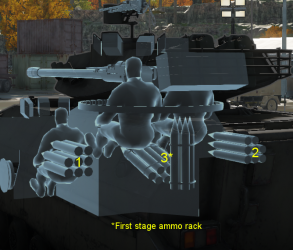
| Full ammo |
1st rack empty |
2nd rack empty |
3rd rack empty |
Visual discrepancy |
|---|---|---|---|---|
| 28 | 21 (+7) | 13 (+15) | 1 (+27) | No |
Notes:
- Shells are modeled individually and disappear after having been shot or loaded.
- Rack 3 is a first stage ammo rack. It totals 12 shells and gets filled first when loading up the tank.
- This rack is also emptied early: the rack depletion order at full capacity is: 3 - 1 - 2.
- Simply not firing when the gun is loaded will move ammo from racks 1 then 2 into rack 3. Firing will interrupt the restocking of the ready rack.
Machine guns
| 7.62 mm FN MAG 60-40 | ||||
|---|---|---|---|---|
| Mount | Capacity (Belt) | Fire rate | Vertical | Horizontal |
| Coaxial | 2,000 (200) | 600 | N/A | N/A |
| Pintle | 2,000 (200) | 600 | -10°/+50° | ±120° |
Usage in battles
The C13 T90 is an amazing light tank, mainly due to its great mobility. At first glance one might not expect much from such a big vehicle, but in reality the C13 T90 is able to easily race ahead of other tanks in the majority of environments. The main reason is due to the power-to-weight ratio of the vehicle, paired up with the adequate engine means the C13 T90 has nearly no problem mobility-wise. The only terrain that the C13 T90 may struggle in is mud, but most tanks will suffer the same fate.
Due to this, a player should put this advantage to use by playing the vehicle as a support/flanker. For example, early in the match the C13's speed makes it possible to scout enemies and take potshots if the opportunity arises in places the enemy might not expect you to be at. In terms of flanking, this vehicle will be mainly directed towards spotting and setting up opportunistic medium-ranged ambushes, whilst sniping is a last resort. The rather small calibre HEAT rounds and the ballistics might not perform as desired at long distances and could just reveal your location to enemies. To practice, make sure to utilize the rangefinder, eventually a player might get used to the ballistics of the vehicle and not even need to rangefind when firing at an enemy.
The C13 T90 has access to the HESH 90 mm round, although the HEAT usually does the trick, it might be useful to bring a few HESH rounds in case you encounter enemies that HEAT simply cannot deal with.
One of the many upsides of the C13 T90 also include the scouting ability, which can be extremely useful for you and your team, if the player also brings a multi-purpose aircraft in the lineup to provide air support, you can really make the best out of this ability, as aircraft spawn costs are reduced every time an enemy you scouted is destroyed by a teammate.
If flanking in a tree-covered map, keep in mind the sensitivity of the HEAT fuse as even the smallest of bushes can detonate the warhead and jeopardize the position. It's best to either move to a spot with less foliage, or stick to scouting the enemy.
Unlike the AUBL/74, the C13 does not posses any sort of amphibious abilities, so do not try to traverse deep sections of water, as you'll just drown inside your vehicle.
The C13 T90 is also capable of brawling, which can go hand-in-hand with the support role. As long as you're able to find a spot which can cover most of your vehicle, a player can remain close to the front-lines to perform a range of tasks, such as repairing allied vehicles and helping in capturing points. One of the few downsides of the C13 T90 is it not being very survivable, your armour is only really effective against enemy machine gun fire, and in some lucky cases you may survive an artillery barrage coming your way. Enemies will usually take you out in one shot, so it's advised that you either keep moving or you stay hidden in one spot where you won't be at risk of getting spotted. Good situational awareness is also recommended when playing this vehicle. After a few minutes into a match, enemy air will start to make its presence known. Enemy aircraft can easily take you out, even weaker rockets will seriously damage your vehicle if not outright take you out. To maximize your survivability, it's best to take refuge inside a building, and hopefully wait for a friendly SPAA to take the air threat out for you.
Pros and cons
Pros:
- 90 mm HEATFS comes stock - HESH and smoke shells are unlockable later
- Rather good traverse and elevation rates allowing for quick reaction to incoming enemies
- Amazing mobility
Cons:
- Armour is not very effective
- Gun is not stabilised
History
The OTO Melara C13 family of vehicles would begin development during the early 1980s. First officially announced in 1981 in many Italian military magazines, the C13 was specifically developed in the hopes for the Italian army to replace the several American M113 APCs they had in service. It was presented publicly in its basic version in 1982 as the first prototype armed with a 12.7 mm machine gun. This APC version would be able to carry 11 infantrymen and the driver, and would be powered by a Isotta-Fraschini supercharged diesel engine which produced 330 hp, it would also have a considerable top speed (60 km/h) for a vehicle of the era. It would also have a range of 500 km, which made it a very desirable vehicle for many nations that operated the M113 APC. Technically speaking, it could also be amphibious but to make it work, no form of turret was able to be installed so only the APC variant could cross bodies of water, it would be propelled similarly to the M113. It wouldn't be very armoured, but when compared to the M113 APC it did offer an improvement.
More testing of the first prototype lead to around 5 more prototypes to be made, some with some quite unique armaments. The OTO C13 would be able to be configured in many variants, which included the TC-20, either armed with a 20 mm RH202 auto-cannon or 25 mm Oerlikon auto-cannon. Another version would be the TUA (TOW under armour) version which would use the M901 ATGM system. In the anti-air sector, there were plans to create the C13 25x4, which utilized the SIDAM-25 turret, although all the parts were constructed, due to political reasons the anti-air version never actually would be fully put together. Lastly, but certainly not least, there was the CKL T90 version, which would be armed with a Cockerill Mk3 90 mm cannon. This version specifically would utilize the same turret and armament that was previously installed on the Fiat 6616 / AUBL/74. Unfortunately, none of these models would actually be picked up by the Italian army.
In the export market, it did generate some interest, a model of the C13 had been evaluated in Iraq at one point. However, the economic and political situations of the 1991 Gulf War would seriously impact the commercial success of this family of tracked vehicles, similarly to the OF-40. Another nation that showed some interest was Germany, more specifically Mak System Gesellschaft which wanted to cooperate with Italy to create a more advanced family of vehicles based on the OTO C13, this would lead to the OTO AV-90 (armoured vehicle 90) which would be based on the C13 but incorporated a series of improvements. The AV-90 program would likely have its funding cut by Germany so the program was shut down, thus putting an end to any sort of potential buyers of the vehicle.
Overall this project had shown great potential, and despite the C13 and later on the AV-90 both proving to be vast improvements of the M113, due to political reasons the project did not ever go past the prototype stage. Currently a few prototypes of the C13 remain inside of the OTO Melara factory in La Spezia, awaiting restoration for the eventual musealization of the vehicle at the Museo Della Melara in Italy.
Devblog
In 1978, the OTO Melara company initiated a private venture to develop a new IFV design which would fill the gap between the widely used M113 APC in service with Italian forces at the time, the Dardo IFV which was still under development and the British FV510 Warrior. As the project’s development progressed, it was increasingly being promoted as the prospective successor to the dated M113.
In 1982, the first prototype of the vehicle was constructed, followed by two further prototypes in 1984. While undergoing testing, several differently armed versions of the vehicle were created in order to make the vehicle more versatile. Among these various armament options, a version with a 90 mm low-pressure gun was also tested.
However, outright succeeding the M113 proved increasingly challenging to OTO Melara as testing continued throughout the 1980s. Among the many reasons was the sheer widespread and cost-effective availability of the M113 worldwide, especially following the end of the Cold War in the early 1990s. Despite work on the vehicle continuing throughout the 1990s, no orders ended up being placed. As a result, OTO Melara cancelled further work on the vehicle and the project was made dormant altogether. In the end, only three prototypes of the C13 were ever constructed.
Media
Excellent additions to the article would be video guides, screenshots from the game, and photos.
See also
External links
- [Forum] OTO C13 light tanks and variants
- [Forum] OTO Melara AV-90 (Armoured Vehicle 90)
- [Devblog] C13 T90: Senior Scout
| Italy light tanks | |
|---|---|
| Italy | |
| L6/40 | L6/40 · L6/40 (31 Rgt.) |
| M11/39 | M11/39 |
| Autoblindo | AB 41 · AB 43 |
| Fiat 6614/6616 | FIAT 6614 · AUBL/74 · AUBL/74 HVG |
| R3 Capraia | R3 T106 FA |
| Centauro | Centauro I 105 · Centauro I 105 R · Centauro I 120 · Centauro RGO · VRCC |
| Freccia | VBC (PT2) · Freccia |
| Dardo | Dardo · VCC-80/60 · VCC-80/30 |
| Other | C13 T90 |
| USA | ▄M3A3 · ▄M24 · ▄M18 |
| Hungary | |
| WWII | Csaba · Toldi IIA |
| Post | ◔BTR-80A · KF41 |


